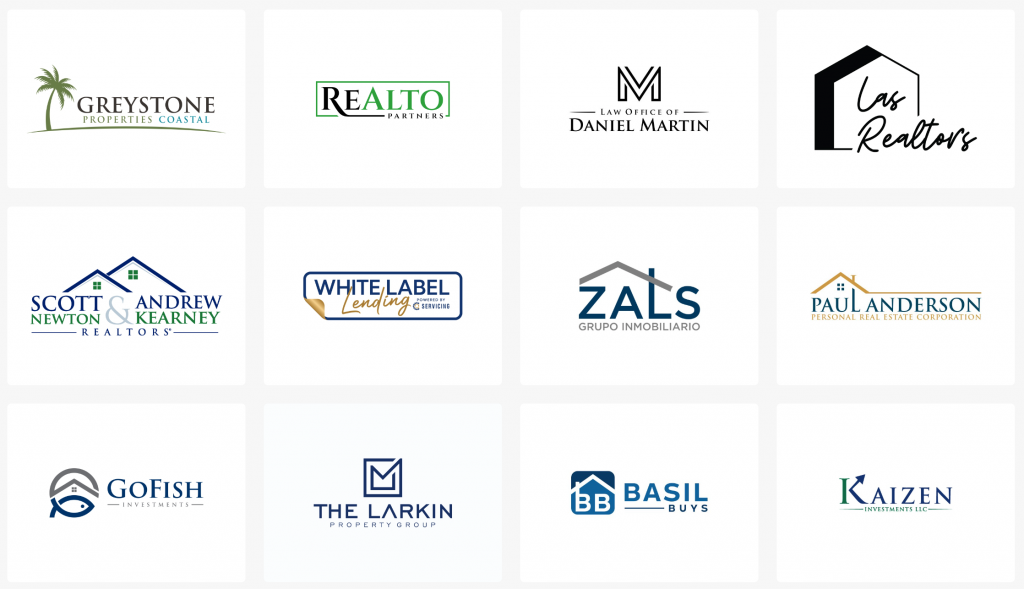In today’s digital age, where first impressions are coming via the web, the institution of a real estate agency website that impresses can’t be overstated. More than just a virtual brochure, your website is a dynamic way to engage potential clients, present properties, and drive sales.

What actually makes a good real estate agency website? What is the difference between a good real estate website logo and a great one? It lies in intuitive design, easy navigation, and strategic content placement. Let’s dive into what comprises an excellent real estate agency website.
The Importance of Web Design for Real Estate
When we talk about real estate web design, we’re referring to more than just aesthetics. For a real estate agency, it’s about creating an experience. Imagine walking into a beautifully staged home—the decor, the layout, the lighting—they all work together to make the space inviting and easy to navigate. A real estate website should aim to achieve the same effect. It needs to capture the essence of your agency’s brand and the properties you’re selling while being intuitive and user-friendly.
At the heart of excellent real estate web design is simplicity. Visitors should be able to find what they’re looking for with minimal clicks. Property listings, high-quality images, and essential information like prices and contact details should be readily accessible. The design should also consider mobile users since a significant portion of real estate searches now happen on smartphones and tablets. Responsive and user-centric design isn’t a luxury; it’s a necessity in modern real estate app development.
The incorporation of some interactive features like virtual tours or comparisons of properties will go a long way in enhancing the user experience. These features not only availed potential buyers with an interactive manner of browsing properties but also gave them the detailed information they needed to make informed decisions. If you run a pharma ecommerce store or a marketing agency, it really doesn’t matter as these interactive features can be applied to any industry, enhancing customer engagement and driving conversions. The aim is to get users to stay a little more on the site and smoothly walk them toward making an inquiry or booking a viewing. To ensure these strategies work, make sure to leverage nearshore staff augmentation and partner with developers to build a seamless, user-friendly experience that encourages engagement.
The Role of Real Estate Web Design Firms
Creating a top-tier website is no easy task. This is where real estate web design firms come into play. These specialized firms understand the unique needs of the real estate market and possess the expertise to build websites that cater specifically to realtors and brokers. Unlike general web design firms, those focusing on real estate are familiar with the industry’s nuances, like MLS integration, IDX listings, and the critical need for high-quality visuals.
Everything from custom website design and development to SEO optimization and content strategy is done by real estate website design companies. In this way, firms offering real estate web design cover all aspects of online marketing. Partnering with a design agency can help streamline the entire process, ensuring both aesthetic appeal and functionality. They not only make sure your website looks amazing, but it’s also optimized to perform at the top in search engines, which will keep traffic and leads flowing in.
Additionally, working with a specialized firm can save you time and resources. They are already well-versed in the best practices of real estate web design, meaning they can deliver results more efficiently than a generalist firm. And because they understand the target audience, they can create a website that speaks directly to potential buyers, sellers, and investors, effectively converting visits into sales and driving the users through the ecommerce funnels. However, if you don’t want to outsource this process completely, you can also use mentoring software to connect with experienced web designers who can provide guidance and support.
Key Features of Real Estate Website Design
Let’s find out what are some of the must-haves of real estate website design. These will be the elements that will not only attract visitors but further cause them to take action and become leads and eventually clients.
- Clear Navigation: Your website’s navigation should be intuitive. Categories like “Buy,” “Sell,” “Rent,” and “Contact Us” should be clearly labeled and easy to find. A search function is also vital, allowing users to quickly find properties based on criteria like location, price range, or property type.
- High-Quality Imagery and Videos: In real estate, visuals are everything. High-resolution images and professional videos can make or break a sale. Consider adding virtual tours, drone footage, or even 3D walkthroughs to give potential buyers a more immersive experience. To make these features easily accessible, integrate a video streaming solution that ensures seamless playback across devices. Additionally, utilizing text to video AI can help quickly transform written descriptions into engaging video content, further enhancing the buyer’s experience.
- Responsive Design: As mentioned earlier, a significant portion of real estate searches occurs on mobile devices. Your website must be fully responsive, meaning it should work seamlessly across all devices and screen sizes. This includes optimizing load times, which can significantly impact user experience and search engine rankings.
- MLS/IDX Integration: For real estate websites, integrating Multiple Listing Service (MLS) and Internet Data Exchange (IDX) is crucial. This allows your website to pull listings from various databases, providing visitors with a comprehensive and up-to-date selection of available properties.
- Lead Capture Forms and CTAs: Effective real estate website design always includes strategically placed lead capture forms and clear calls to action (CTAs). Whether it’s a form to schedule a viewing or a CTA to sign up for a newsletter, these elements are key to driving user engagement. They help improve conversion in e-commerce settings and can work just as well for real estate, turning curious visitors into solid leads.
- SEO Optimization: A beautiful website is worthless if nobody sees it. SEO (Search Engine Optimization) is crucial for driving organic traffic to your site. This involves optimizing your website’s content, meta descriptions, and keywords, as well as ensuring fast loading speeds and mobile compatibility. So, working with a link building agency can further strengthen your SEO strategy by improving domain authority and boosting search rankings.
Conclusion
The world of real estate is fiercely competitive, and having a well-designed website is no longer optional—it’s essential. A thoughtfully crafted real estate website design does more than showcase properties; it creates an experience that engages users, builds trust, and ultimately It drives sales.
Whether one is dealing with specialized real estate Web design firms or doing it personally, paying attention to user experience, advanced features, and correct SEO will make it really different from the competition.
Remember, most of the time your website is the first touch that any potential client will have with your brand. Make it count-invest in a design that speaks to your professionalism, showcases your properties beautifully, and leads users toward taking action. This is probably your most powerful tool in a market where first impressions mean everything.
